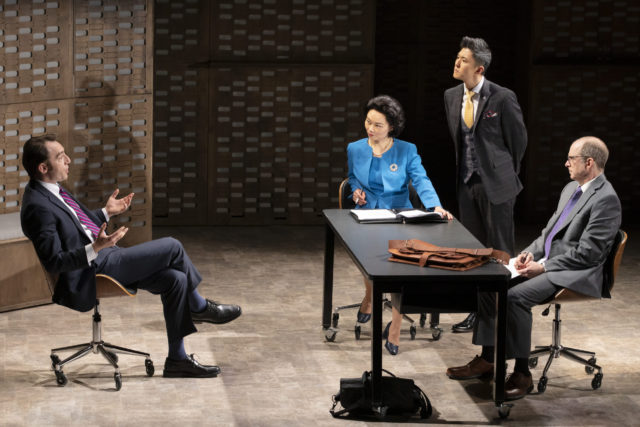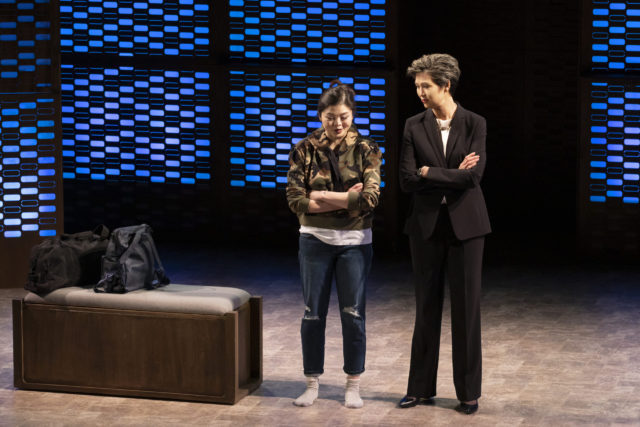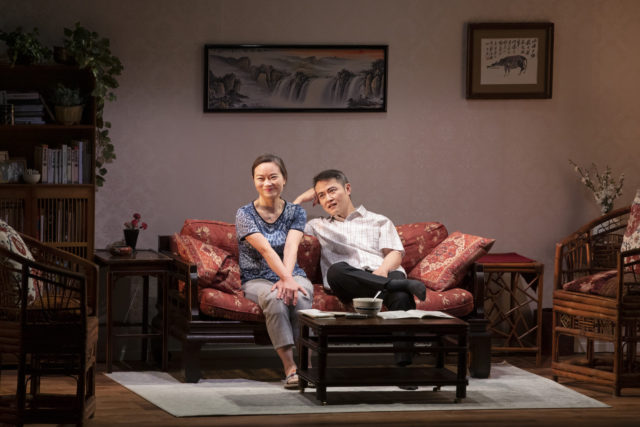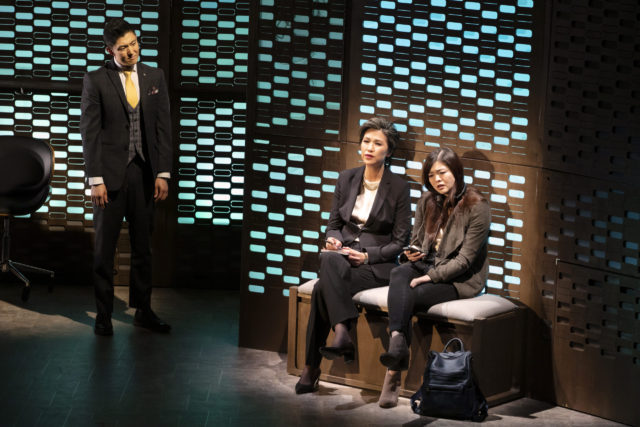
Anchuli Felicia King’s Golden Shield questions language and communication by individuals, corporations, and governments (photo by Julieta Cervantes)
GOLDEN SHIELD
Manhattan Theatre Club
MTC at New York City Center – Stage I
131 West 55th St. between Sixth & Seventh Aves.
Tuesday – Sunday through June 12, $59-$89
www.manhattantheatreclub.com
Anchuli Felicia King uses a volatile court case as a battleground for complex ideas about communication and translation involving family, corporations, governments, and the internet in Golden Shield, which opened tonight at MTC at New York City Center – Stage I.
The two-and-a-half-hour play (including intermission) begins with the Translator (Fang Du) laying some of the ground rules. Discussing the difficulty of translating a Chinese proverb into English, he tells the audience, “I can try to find an English equivalent, if one exists. But of course, I risk making false parallels, unwittingly engaging in an act of . . . linguistic imperialism. Or I can really spell it out. . . . But you do lose some of the beauty of the original. It’ll be much the same with this job, I suspect. . . . Just settle into it. Trust that your mind is a machine. Eventually, it’ll find a focal point. Having said that, it is essential that you concentrate.”
The Translator is speaking about the language in the play as much as the language of the play, which takes place nonchronologically between 2006 and 2012 in Washington DC, Beijing, Yingcheng, Dallas, Palo Alto, and Melbourne. In fact, he’s only a character in the plot a few times; instead, he is primarily an observer, standing off to te side, making certain things clearer for the audience, including filling in details of some characters’ pasts. He also has the innate ability to know when someone is lying.
As lawyer Julie Chen (Cindy Cheung) points out, “There’s a lot of jargon in this case. A lot of legal jargon and a lot of technical jargon.” She’s not kidding, so we need the Translator.
Julie, a managing partner in a firm with Richard Warren (Daniel Jenkins), also needs a translator, for a class-action lawsuit in which eight Chinese dissidents are charging ONYS Systems with criminal collusion with the Chinese government, based on a single bullet point in a document regarding the Golden Shield, a real-life surveillance project involving the Great Firewall of China.

Sisters Eva (Ruibo Qian) and Julie Chen (Cindy Cheung) consider working together in Golden Shield (photo by Julieta Cervantes)
Julie wants to hire her younger sister, Eva (Ruibo Qian), who is in the midst of a long bad streak, as her translator. Eva balks at first — something happened at their mother’s recent funeral that has driven them further apart than they already were — but she ultimately signs on. Their main task is to find one of the eight dissidents to be willing to testify in the United States; their last hope is Li Dao (Michael C. Liu), a professor at the Beijing Institute of Science and Technology who has kept his actual activities secret from his devoted wife, Huang Mei (Kristen Hung). Accompanying the legal team as an adviser on their journey is Amanda Carlson (Gillian Saker) of the Digital Freedom Fund.
The trial is scheduled to be held in Dallas, using the Alien Tort Statute in the Judiciary Act of 1789, implemented, in part, because of piracy on the seas. ONYS is attempting to avoid responsibility — the “onus,” as it were — for its part in the creation of a decentralized firewall that was ultimately, surprise surprise, used by the government to track down citizens they believe to be traitors.
Marshall McLaren (Max Gordon Moore), the smarmy ONYS president of China operations, has no respect for the Chinese and their culture and traditions, refusing to keep quiet even when his VP, Larry Murdoch (Daniel Jenkins), begs him to stay in line as they meet with deputy minister of public security Gao Shengwei (Kristen Hung). He’s the classic ugly American, looking to profit off of others, no matter the cost. “They’re giving us shit,” he tells Larry. “It’s polite Chinese shit, but it’s shit nonetheless, and what I’m saying is, is — if we could have a meeting, one meeting, in an office, in an office with desks, I don’t need another, another fucking five pots of steamed whatever or a fucking egg that’s been fermented for a hundred years in a silk basket at the foothills of Mountain Fing-fong-fang.”

Li Dao (Michael C. Liu) and Huang Mei (Kristen Hung) face dangerous consequences in MTC world premiere (photo by Julieta Cervantes)
ONYS’s chief legal officer, Jane Bollman (Gillian Saker), wants to just buy off the plaintiffs, but Julie wants this case to make a point, to have an impact on international law and take big business and big government to task.
Through it all, the Translator keeps the audience apprised of what is really going on. When Eva tells her sister in English, “Like, I’m okay,” he translates that to “I’m not okay.” When Larry, listening to Marshall read from the document in question, says, “I think it’s a bit of a mistranslation,” the Translator says to us, “It’s not.” As the trial continues, the importance of language and communication remain at the heart of the play and not just from a legal standpoint. “There’s enough miscommunication in the world,” Amanda tells Eva. “I don’t want to spend all night reading between the lines and, like, searching for a sign, or symbol, like, a sexual visual metaphor, because if you just like say, upfront, what you mean, then like, you don’t need to translate, you know?”
Developed at MTC’s Australia-based Next Stage Writers’ Program, Golden Shield is masterfully directed by May Adrales (Vietgone, Letters of Suresh), guiding us through the ever-shifting time periods and locations, with scene changes indicated by furniture rolling on- and offstage and different colors flashing behind walls with cut-out patterns. (The set design is by Dots, with lighting by Jeanette Oi-Suk Yew, original sound and music by Charles Coes and Nathan A. Roberts, and costumes by Sara Ryung Clement.)
King (White Pearl) does an excellent job defining the characters and sifting through the jargon to make her points about communication, and not just in the digital age. There’s a kind of poetry to the language, a melding of corporate- and tech-speak, legalese, English, Chinese, and everyday talking. King has called the play itself “a valuable political act,” and that’s just what it is.

The Translator (Fang Du) keeps the audience informed as he watches the action onstage (photo by Julieta Cervantes)
And it all starts with Fang Du (Golem, Low Power), who is eminently likable as the Translator, a kind of version of the Stage Manager in Thornton Wilder’s Our Town. If he doesn’t capture our attention, it becomes a completely different experience. In the script, King notes, “The Translator is an intermediary between the audience and the action. They intervene in the action only when their presence becomes essential. They are otherwise engaged in an act of self-abnegation.” That self-abnegation stands in direct counterpart to the desires of most of the characters, who can be selfish, grating, mean-spirited, uncaring, passive-aggressive, and self-defeating. In this digital surveillance age where less and less communication occurs in person, face-to-face, Fang Du’s good-natured portrayal of the bright and cheery, ever-smiling Translator is a necessary respite from the hard points the narrative makes. That’s why we need the Translator.